LOVE, DARLA is the start of a new era for Laveda. The band’s first release since relocating from Albany to New York City, it’s also a major shift from the dream pop of their first two LPs to a darker, more aggressive sound—as they say in the liner notes, “shedding the lush, warm sounds previously inspired by the sprawling beauty of upstate New York, and instead embrace the gritty and complex aesthetics of their new home.” MGRM had the chance to sit down with founding members Ali Genevich and Jake Brooks to discuss the new album, their move south, and how to sequence an LP to piss off your fans.
You’ve been playing “Heaven” and “Strawberry” from the new album live. What’s been the reception to those tracks?
Ali Genevich: They’ve been good. Those were the first two we incorporated, and we started playing them in March of last year. The rest (of the album) wasn’t written yet. But they got a good reception from the two, and that helped us move into the direction we ended up taking.
I remember listening to the advance of the album after “Heaven” came out and being really surprised. It’s a much more abrasive record than I expected. What pushed you in that direction sonically?
AG: A lot of the bands we like are more like that. Also, formative bands in my youth—I listened to a lot of dream pop, but also a lot of rock, and I’d never explored that. We both got into Blonde Redhead after the new album SIT DOWN FOR DINNER, and that was dreamy and chill and I got obsessed with it.
Jake Brooks: And the first three after that.
AG: It’s like a heavier Radiohead. They’re so much better!
There are a lot of bands in the dream pop realm, and a lot of bands in the Dischord realm, but not a ton doing what you are doing mixing the two. It’s a very cool sound.
JB: A lot of our friends put us onto Fugazi then, and we watched that documentary (INSTRUMENT). We got into the noise rock stuff from the ‘90s.
AG: A lot of those bands I knew songs—I know Fugazi but never scratched beyond the surface. If you don’t know the one song to get you in, then you won’t get in.
A lot of the time when bands move into a heavier direction, they’ll say that’s really closer to how they sound live. Is that probably true for you?
JB: Yeah, and that’s part of it. The first record was just us and our friend Dylan throwing stuff at the wall. It was a fun process. The second was in the middle of the pandemic, and we’d only toured once, not for long. We hadn’t played in a year and we didn’t know what we’d sound like live. We just threw shit at the wall there. We toured a lot before this one, and we knew what Joe and Dan brought to the table. We knew what we sounded like.
AG: Yeah, COVID delayed our interpersonal development as a band. You’d only see people for these set times, and it wasn’t very casual. Maybe you get a beer after you rehearse, but that’s it. After spending months on the road, that’s who people are. We wrote the album with the band in mind—it feels like a new band. We thought about that. But I hate when bands are the same band and just change their name. We decided against it. I thought we’d confuse people.
So this was a wholesale change, every aspect of the band shifting.
AG: Yeah, and I think the move solidified that. Being based in Albany and now in the city, writing it all in the city, everything’s different. But it’s the same, also!
I know that’s a lot of what inspired the record. What effect, in terms of how you write, did the move have on your songwriting?
AG: I think for me it’s harder to write a pretty song living in New York. Upstate is so beautiful, and I took it for granted. Trees everywhere, grass, trees, grass—beautiful. I think the landscape’s always played a part. In the LA area working on A PLACE YOU GREW UP IN, that was a big inspiration. The environment always affects me, inspires me.
JB: I also think that the way you listen is different in the city. At least for me, both engineering- and writing-wise, I was making songs for cars, listening to them in the car. I was working on things that sounded good in a car, driving. In the city you’re writing music for the train, in headphones, Airpods, or our apartment speakers. What resonates changes.
Does then that affect whether or not it’s a social experience, listening in the car with people versus in headphones by yourself?
JB: Yeah. It’s a different mentality, and it leads you to listening to new things. It got us into a lot of noise rock. I was into Brainiac. I put that on on a roadtrip and it was terrible. It’s all cymbals. But in headphones it fucking slaps.
What’s been the best thing about being in the city?
AG: I like that there’s always a new place to go. I am such a spontaneous person. I think I have routines, but it’s this moldable routine that changes—things are the same, but maybe at different times. I like going to a coffee shop you’ve never heard of, being immersed in a new environment. When you’re upstate, it’s the same place. There’s only one cool coffee shop, one cool bar, and you know everyone who works there.
JB: And that’s cool! It’s cool to experience knowing the people around you. My favorite thing is the people. There’s so many likeminded people. You can skip all the bullshit and relax.
Can I get you to weigh in on the mayoral race, then?
JB: I think it’s obvious where we stand.
AG: I fucking hope Zohran pulls through. It’s scary. The victory was so awesome. The primary win was amazing.
What’s the vibe out there?
JB: There’s a lot of energy. People don’t even want it to be a question, especially our generation.
AG: I really hope—my friend and I were talking about this—I hate that the primary and the election are so spaced out. If this were an album campaign I’d say it’s a horrible idea!
JB: He dropped the single, but where’s the album?
AG: I think the vibe is good. Right after the primary it was really cool. Everyone was so happy and it was the polar opposite of the Trump win. We were at the bar, Old Stanley’s, and we went to a show. The whole bar was—it was awful. When Zohran won, the city was electric. It was a major heatwave too, and people were still out.
What other songs have you been playing?
JB: We’ve played everything (on the album) but “Dig Me Out.”
Damn, that’s my favorite.
AG: You’re not the first person to say that. This summer we really wanted to make sure we had it all down before the album release. We like playing new stuff and it’s been hard not to.
What are your favorites to play live? Or which are you most excited for people to hear?
AG: I think “Highway Meditation” is the most fun to do live. Joe has basically coined this term—he says he feels possessed when we play it. I agree. We just love it. It’s a really fast song, and I play bass on that, and it’s hard to scream and play bass fast. I feel like I’m gonna throw up screaming so loud and playing so fast.
JB: I think mine—and I love that as well—is “I Wish.” I like singing on it. I like the lyrics a lot. I like the supporting vocals on the track.
“Bonehead” and “Lullaby” I like a lot, and I was wondering if there’s a connection between the two. “Bonehead” has that lyric at the end, “I want to sing you a lullaby.”
AG: “Lullaby” was the last song written, and we didn’t know how the album was gonna end. I wrote that song, and I named it that because it felt fitting, and thought it’d be cool because of that line. Yes and no; there’s a slight connection.
When that one was written then, you knew it was the closer?
AG: Pretty much immediately. Jake really liked the demo, and that’s got my favorite part on the record, and Jake wrote it. It’s awesome. It wasn’t heavy at the end initially.
JB: It was a slowburn. Creepy.
AG: It was all slow, dark. Eerie. When we brought it to the band we thought it’d be cool. Our friends are in this band called Hot Spit from Richmond, and I think they inspired the heavy part.
“Care” is a really bold opener. It’s very long, it’s very heavy, and it’s very different from the older material. Why did you choose that to open it?
JB: When we wrote it, we knew. The feedback was integral. It sounded like an orchestra tuning.
AG: We both come from a classical string background, and I love that anticipation. I think with our sound being so different, if you make it through that, then you deserve to hear the rest. It’s pretty abrasive as a start.
JB: Maybe the most abrasive.
AG: I think it sets the tone for sure. The rest is a cakewalk after “Care.”
You put out the first album in 2020, and I assume you were writing that in 2019 or so. If you could go back to the Ali and Jake of that time, and you tell them you’d be working on LOVE, DARLA in six years, what would they say?
AG: I think the second record would not have happened. I’d just say we have to do this.
JB: We were into Land of Talk then, and this could’ve led us down that path.
AG: I really liked that dreamy sound. But maybe getting older you realize nothing feels like that in real life.
JB: Our favorite songs would be different. Mine would.
Who is Darla?
AG: I will give you this: Darla is an alter ego. Not just one alter ego.
JB: If you’d made different decisions in the past, a parallel universe alter ego.
AG: A lot of the songs came from wondering what would’ve happened if I’d made another decision in my life.
You can snag a copy of LOVE, DARLA over on Bandcamp!


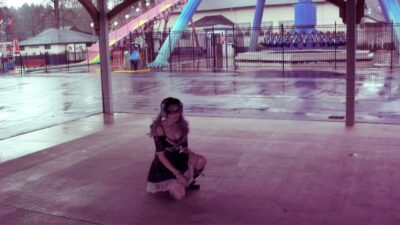
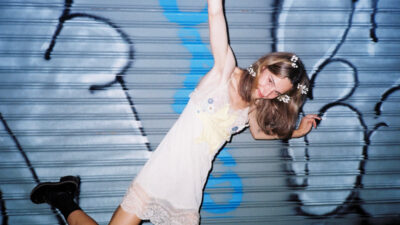
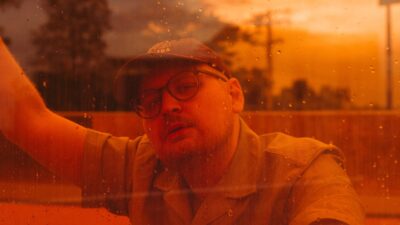
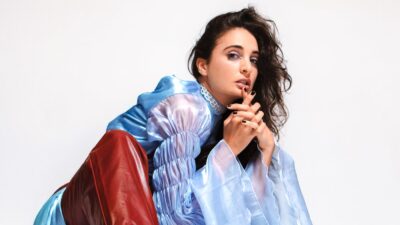
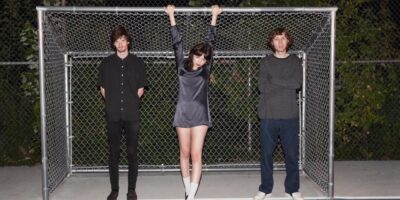

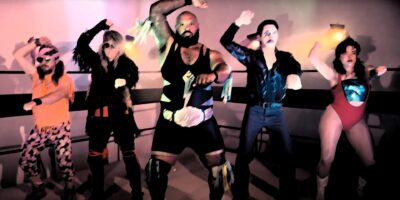
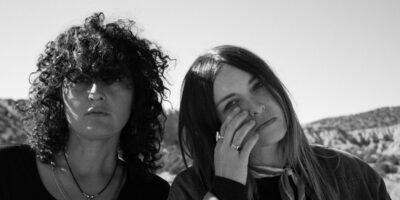
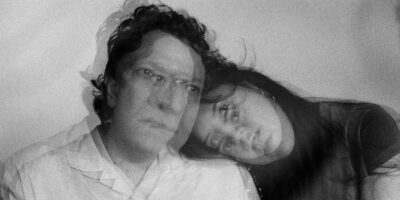
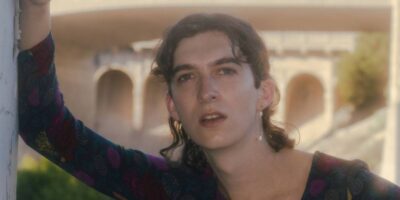




Comments